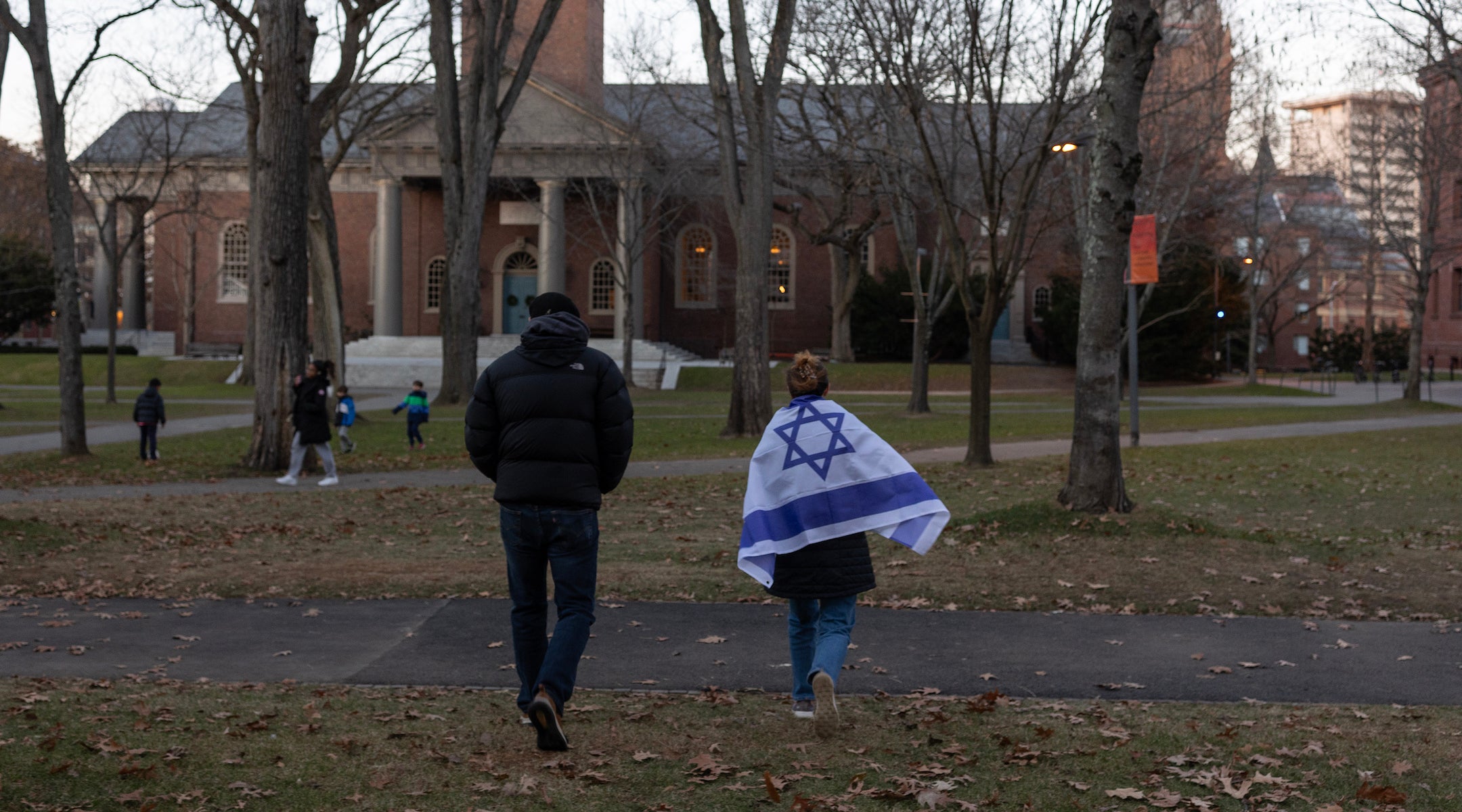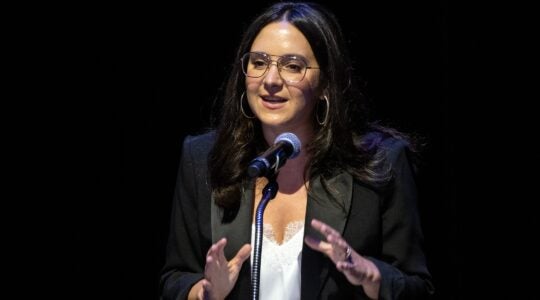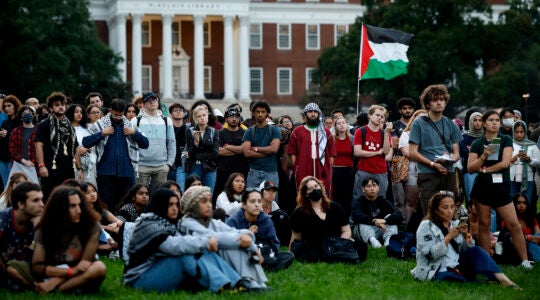The Trump administration has revoked its permission for Harvard University to enroll international students, in a dramatic escalation of what the Department of Homeland Security says is an effort to curb antisemitism at the university.
The move “means Harvard can no longer enroll foreign students and existing foreign students must transfer or lose their legal status,” a Thursday DHS press release states.
The order does not appear to carve out exceptions for Israeli or other international Jewish students. Asked if the order would also apply to Israeli and international Jewish students, a DHS representative directed the Jewish Telegraphic Agency back to the initial statement.
Jewish leaders at Harvard, including the director of the school’s Hillel, believe such students will also be targeted by the ruling, and at least one Israeli student who spoke with JTA believed the order would target them, too.
“As far as we know, the ban is universal. There are no exceptions,” said Genia Lukin, an Israeli doctoral student in Harvard’s psychology department.
Lukin is in her third out of five years with the program, studying language acquisition in babies who are blind. She initially enrolled at Duke University, but her lab moved to Harvard shortly before Oct. 7. She plans to return to Israel once she’s finished her doctorate — if she’s not forced back earlier.
“I am annoyed, obviously. This is not what we needed,” Lukin said. “A lot of the Israelis are feeling pretty angry, because we both were dealing with all the stuff on campus throughout the last two years, which was a substantial drain on our mental health and well-being, and now we’re also being punished, in a way.”
The government pulled the university’s Student and Exchange Visitor Program certification, which allows it to enroll nonimmigrant international students. “This administration is holding Harvard accountable for fostering violence, antisemitism, and coordinating with the Chinese Communist Party on its campus,” Homeland Security Secretary Kristi Noem said in the release, explaining why she was taking the unprecedented step.
The move comes a week before Harvard’s commencement exercises. The school enrolled about 6,800 students from abroad last year, making up just over a quarter of the total enrollment, according to university data.
The block on international students is the latest salvo in the war between Trump and Harvard, ostensibly over antisemitism. In recent weeks, the battle has included three rounds of federal funding cuts totalling billions of dollars, a lawsuit filed by the school, and efforts to revoke the university’s nonprofit status.
While some prominent Jews have praised Trump’s Harvard crackdown, many others say the administration’s actions appear more focused on damaging higher education than addressing the concerns of Jewish students.
A not-insubstantial number of Israeli and other international Jewish students attend school at Harvard. The International Jewish Student Center of Boston, overseen by Harvard Chabad, was founded specifically to cater to their needs, as well as those of international Jewish students at other area schools. Recent events at the center included a barbeque for Brazilian Jewish students.
A representative of the center directed a request for comment to Harvard Chabad. The Chabad director, who has been a vocal critic of university leaders for fostering antisemitism since Oct. 7, did not return multiple requests for comment.
Since Oct. 7, some international students at Harvard were among those found to have agitated against Jewish and Israeli students on campus. A recent antisemitism task force report spelled out some of these instances. But Israeli students at Harvard, who will also likely be affected by this order, have also been among the most visibly targeted.
Lukin said the task force report was, “if anything, understated.” She personally knew many of the Israeli students whose accounts were cited by the task force, and said she, herself, had also experienced targeting on campus for activities including advocating for Israeli hostages. “It’s been an especially unpleasant environment.”
But, she said, the actions of the Trump administration would not address the problem. If anything, she said, the pulling of federal grants — which has hit her department and many others — has fostered more campus antisemitism in the backlash.
“People are responding to the issue of antisemitism more negatively because the grants have been pulled,” she said, adding that some at Harvard were now less likely to see antisemitism as a serious problem. She added that it’s now “treated as if it were a lever in the administration.”
Reached for comment, Harvard Hillel director Rabbi Jason Rubenstein provided a statement he initially made last month as the Trump administration began ramping up its attacks on Harvard, criticizing what he described as “the current, escalating federal assault against Harvard.”
Rubenstein said that among the administration’s actions were “threatening all student visas, including those of Israeli students who are proud veterans of the Israel Defense Forces and forceful advocates for Israel on campus.”
In a statement, a spokesperson for Harvard told JTA the administration’s actions are “unlawful” and said the university would fight to be able to enroll students from abroad.
“We are fully committed to maintaining Harvard’s ability to host our international students and scholars, who hail from more than 140 countries and enrich the University – and this nation – immeasurably,” the spokesperson said. “We are working quickly to provide guidance and support to members of our community. This retaliatory action threatens serious harm to the Harvard community and our country, and undermines Harvard’s academic and research mission.”
Requests for comment to two organizations advocating for Jewish interests at Harvard, Harvard Jewish Alumni Alliance and The 1636 Forum, were not immediately returned. A spokesperson for the first group announced on social media she would be “stepping away” Thursday, as the DHS ruling came down.
Requests for comment to some active Harvard student organizations with a focus on Israel and Israelis were also not returned.
While Israeli and other international students wait for more guidance, Lukin said there are options that they could explore. They could try to apply for citizenship, transfer to another school, or potentially finish their programs over Zoom. Any one of them would be a major disruption, and none would help address the supposed reason the Trump administration was taking the action.
“The problem of antisemitism on campus is a very real problem,” she said. “I’ve experienced it for two years. I’m looking at it in the face quite a bit. I think it’s very important to address it and solve it, in ways that are effective and efficient.
“But I would like to see a better environment that doesn’t hurt, indiscriminately, people who have absolutely no reason to be hurt.”
JTA has documented Jewish history in real-time for over a century. Keep our journalism strong by joining us in supporting independent, award-winning reporting.






